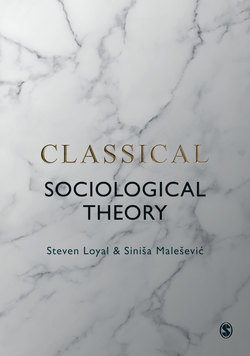Classical Sociological Theory

Реклама. ООО «ЛитРес», ИНН: 7719571260.
Оглавление
Sinisa Malesevic. Classical Sociological Theory
Classical Sociological Theory
Contents
Acknowledgements
About the Authors
Introduction: The Rise of Social Thought
The Layout of Chapters
Notes
References
I Plato and Aristotle
Plato. Life and Intellectual Context
Peloponnesian War
The Ionian and Italian Schools of Natural Philosophy
Historical, Social and Political Context
The Restrictions of Citizenship in Greece
Slaves, Foreigners and Women in Athens
Against Democracy
Arguments and Ideas
The Ideal State and the Division of Labour
Criticism
Aristotle. Life and Intellectual Context
Historical, Social and Political Context
Arguments and Ideas. Metaphysics
The Nicomachean Ethics
The Politics
Criticisms
Contemporary Relevance
Conclusion
Note
References
II Confucius and Ibn Khaldun. Introduction
Life and Intellectual Context. Confucius (551–479 bce)
Ibn Khaldun (1332–1406)
Historical, Social and Political Context. Ancient China
Medieval North Africa
Arguments and Ideas. Confucian Social Philosophy
Discipline and Morality
Ibn Khaldun as the First Proto-sociologist
The Rise and Fall of Civilisations
Group Feeling
Contemporary Relevance and Applications
Criticisms
Conclusion
Note
References
III Tocqueville and Martineau. Introduction
Life and Intellectual Context. Tocqueville
Harriet Martineau
Historical, Social and Political Context
Social Changes
Industrialisation
Arguments and Ideas. Democracy and Civil Society
The Social Origins of Revolution
Political Economy and Capitalism
Morals and Manners
Contemporary Relevance and Applications
Criticism
Conclusion
References
IV Hegel
Life and Intellectual Context
Move to Jena
Intellectual Context
Historical, Social and Political Context
The Situation in Germany and the French Revolution
The Rise of Napoleon
Arguments and Ideas
Speculative Hermeneutics
Theory of the Absolute/God/Spirit
The Phenomenology of Spirit, the Social Self and Recognition
The Philosophy of History
The Philosophy of Right
Contemporary Relevance and Applications
Criticisms
Conclusion
References
V Marx. Introduction
Life and Intellectual Context
Marx as a Communist
Intellectual Influences
Historical, Social and Political Context
Arguments and Ideas. Early Critique of Hegel
A Theory of Human Nature
Productive Activity and Alienation
The Materialist Theory of History
Class Struggle
The Role of Ideas and the State
Political Economy
Contemporary Relevance and Applications
Criticisms
Conclusion
References
VI Weber. Introduction
Life and Intellectual Context
The Legacy of War
Historical, Social and Political Context
Reform and Empire
Cultural Values
Arguments and Ideas. Methodology
Historical Sociology
Religion and Capitalism
Power, Legitimacy and Bureaucracy
Contemporary Relevance and Applications
Criticisms
Conclusion
References
VII Durkheim. Introduction
Life and Intellectual Context
The Durkheimian School
Educational Reforms and War
Historical, Social and Political Context
Political Divisions
The Dreyfus Affair
Arguments and Ideas
The Science of Sociology
Social Change
The Sociology of Deviance
The Sociology of Religion
Contemporary Relevance and Applications
Criticisms
Conclusion
References
VIII Simmel. Introduction
Life and Intellectual Context
The Unpaid Lecturer
Public Intellectual
Historical, Social and Political Context
German Society and Cultural Change
Interactions and Urban Life
Arguments and Ideas. Methodology
Social Interactions
Modernity
Contemporary Relevance and Applications
Criticisms
Conclusion
References
IX Pareto, Mosca and Michels. Introduction
Life and Intellectual Context. Vilfredo Pareto
Gaetano Mosca
Robert Michels
Historical, Social and Political Context
Social Divisions in Italy
War and Social Change
Arguments and Ideas. Pareto and the Circulation of Elites
Mosca and the Political Class
Michels and the Iron Law of Oligarchy
Contemporary Relevance and Applications
Criticisms
Conclusion
References
X Hintze, Gumplowicz, Ratzenhofer, Ward and Small. Introduction
Life and Intellectual Context. Otto Hintze
Ludwig Gumplowicz
Gustav Ratzenhofer
Lester Ward and Albion Small
Historical, Social and Political Context. The Legacy of German Unification
Cultural Difference and the Austro-Hungarian State
The United States and Social Change
Arguments and Ideas. Otto Hintze and the Historical Sociology of Coercive Power
Ludwig Gumplowicz and the Group Struggle
Gustav Ratzenhofer and the Conflict of Group Interests
Lester Ward and Social Synergy
Albion Woodbury Small and the Sociology of Conflict
Contemporary Relevance and Applications
Criticisms
Conclusion
References
XI Du Bois
Life and Intellectual Context
The Move to Atlanta
Intellectual Influences
Historical, Social and Political Context. Slavery as an Institution
The American Civil War
The Rise of Jim Crow
Conflicts over Political Strategy
Ideas and Arguments
The Philadelphia Negro
The Negro Problem and The Souls of Black Folk
Black Reconstruction in America, 1860–1880
Applications and Influences
Criticism
Conclusion
References
XII Mead
Life and Intellectual Context
Intellectual Influences
Historical, Social and Political Context
The Importance of Pragmatism
Ideas and Arguments. Mind, Self and Society
Mind, Self, and Society
Social Acts and the Conversation of Gestures
Significant Gestures
The Self
The ‘I’ and the ‘Me’
Society
Applications and Influences
Criticism
Conclusion
References
Index
Отрывок из книги
Steven Loyal
I would like to dedicate this book to my former teachers who served as exemplary academic role models, István Mészáros and Barry Barnes.
.....
Aristotle conceives ethics as part of what he calls the ‘practical sciences’ – which also include politics. These are separated from the theoretical and productive sciences in terms of their ends and objects. His aim in the Nicomachean Ethics is not to teach for the sake of knowing, which is the aim of the theoretical sciences, but a practical aim, so that men can lead good, happy, lives. It is to tell people how to act in the world, akin to providing a skill as in artistic production. The methodology and approach used in the practical arts must be also commensurate with the subject matter being dealt with. Here scientific precision and exact knowledge are, for Aristotle, impossible since ‘noble and just actions’ exhibit ‘much variety and fluctuation’ so that one can only ‘speak about things which “are only for the most part true” that is roughly and in outline’ (Aristotle, 2014: 1094b).
It was noted earlier how the principle of self-sufficiency was a central value in Greece. Drawing on his principle of hierarchy, Aristotle argues that the highest good must be wanted for itself, and not as a means to something else; it must be self-sufficient, and lack nothing. Although all actions aim at some purpose or good, some goods or ends are means for seeking higher goods or ends, of which one is the final chief good, ‘that for whose sake of everything else is done’ (Aristotle, 2014: 1097b).
.....